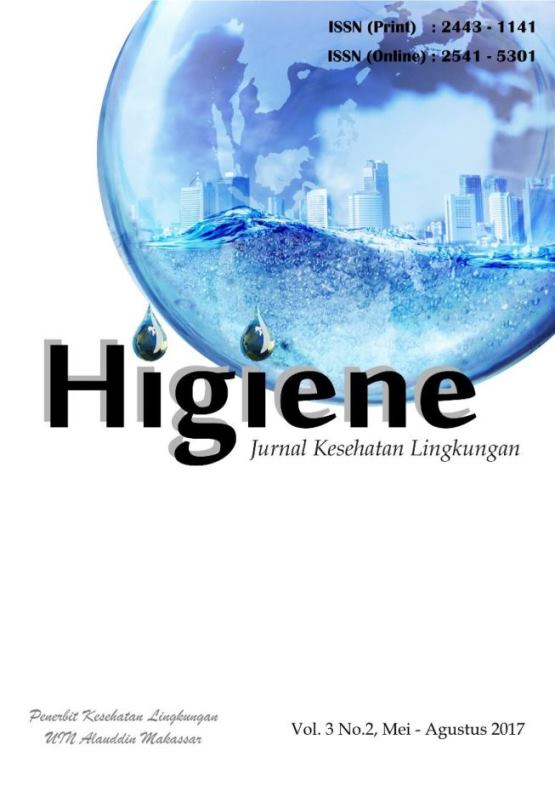Kualitas Air Minum Isi Ulang Pada Depot Di Wilayah Kerja Puskesmas Dahlia Kota Makassar
Abstract
The quality of drinking water consumed should be eligible. Based on data obtained from the Department of Health Makassar number of diarrhea patients in the District Panakkukang as many as 2,753 people. While the quality of water taps for the District Panakkukang including clean water class D category is very bad because it found the bacteria Escherichia coli > 1100 cells / 100ml. The study aims to determine the content of Escherichia coli in DAMIU in District Panakkukang Makassar.
This research uses observational analytic with cross sectional approach. Population of 81 de-pots drinking water, sampling was done by purposive sampling at 22 water depots then examined and analyzed in the laboratory.
The results showed that of the 22 samples studied contained 20 AMIU eligible and 2 AMIU are not eligible. This happens because the used processing equipment functioned properly. The sam-ples were positive for Escherichia coli bacteria in addition to the sanitary conditions around the depot that bad either condition processing equipment used do not function and some processing tools has been severely damaged. The results of the analysis showed no relationship between equipment pengolahan drinking water with Escherichia coli p value 0,026 and there was no corre-lation between the condition of the drinking water treatment, hygiene condition handlers and also raw water with Escherichia coli p value 1.000.
The Suggested to the owner DAMIU in Sub Panakkukang already qualified drinking water quali-ty based on the Minister of Health in 2010 in order to keep the quality of drinking water produced and for DAM produced do not qualify for more attention to processing equipment used and re-place all the tools that are not feasible used or expired.
Keyword : MPN E.coli, Hygiene sanitation, DAMIU
References
Abdilanov, D,2012. Pelaksanaan Penyelenggaraan Hygiene Sanitasi Dan Pemeriksaan Kualitas Air Minum Pada Depot Air Minum Isi Ulang Di Kota Padang Tahun 2012. Srkipsi. USU.
Alang. H. 2015. Deteksi Coliform Air PDAM di Beberapa Kecamatan Kota Makassar. Jurusan Biologi. Fakultas Sains dan Teknologi. UIN Alauddin Makassar.
Putri,E.,M.,D.2015.Hubungan Hygiene Sanitasi Dengan Kontaminasi Bakteri Coliform Pada Air Minum Isi Ulang Di Kecamatan Seberang Ulu Kota Palembang Tahun 2015. Palembang. Fakultas Kedokteran Dan Ilmu Kesehatan.(Skripsi)
Saleh, R dkk.2013. Efektivitas Unit Pengolahan Air di Depot Air Minum Isi Ulang (DAMIU) dalam Menurunkan Kadar Logam (Fe, Mn) dan Mikroba di Kota Pekalongan. Jurusan Kesehatan Lingkungan Indonesia. Vol. 12 No. 1 / April
Simbolon,V.,A.dkk, 2012 Pelaksanaan Hygiene Sanitasi Depot Dan Pemeriksaankandungan Bakteri Escherichia Coli Pada Air Minum Isi Ulang Di Kecamatan tanjung pinang Barat Tahun 2012. Fakultas Kesehatan Masyarakat.USU.
Sumantri, D.,H,A. 2013 Kesehatan Lingkungan, Kencana Prenada Media Graup, Jakarta.
Tombeng, R.,B. Polii,B. and Sinolungan,S. dkk.2013. Analisis Kualitatif Kandungan Escherichia Coli Dan Coliform Pada 3 Depot Air Minum Isi Ulang Di Kota Manado. Jurusan kesehatan masyarakat.
WHO. 2008. Guidelines For Drinking- Water Quality Third Edition. Geneva : WHO Press.
Copyright (c) 2017 HIGIENE: Jurnal Kesehatan Lingkungan

This work is licensed under a Creative Commons Attribution-ShareAlike 4.0 International License.


